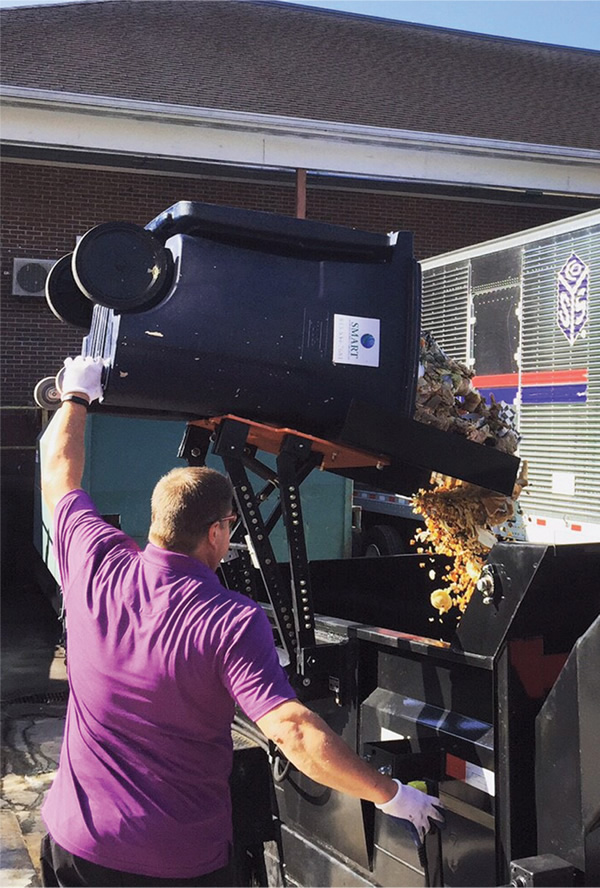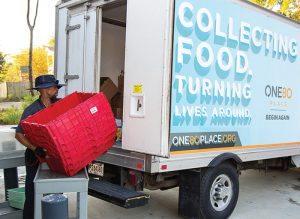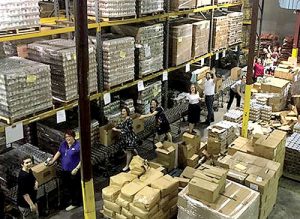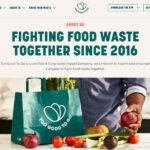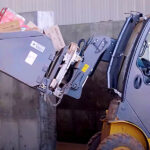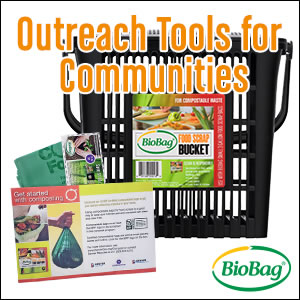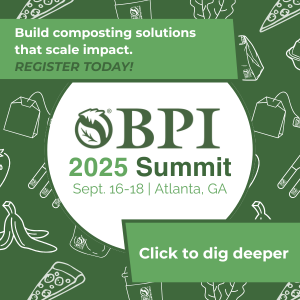The State of South Carolina takes steps to foster development of composting facilities, recover edible food and divert food waste from disposal.
Richard Chesley
BioCycle October 2015
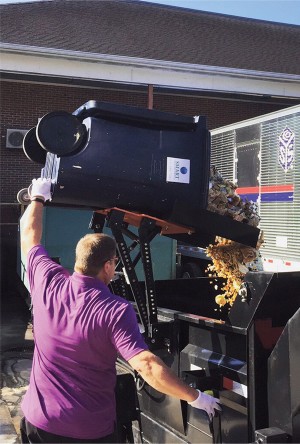
SMART Recycling of South Carolina collects food scraps in the Charleston area, which are composted at the Charleston County Bees Ferry facility.
The numbers tell the story. South Carolina was generating an estimated 600,000 tons-plus of food waste annually — the vast majority not being recovered.
“This was an issue we needed to address and we did,” explains Elizabeth Dieck, Deputy Director of the South Carolina Department of Health and Environmental Control (DHEC). “The first step was to revise the composting regulation in order to provide industry with a clear path toward permitting food waste composting facilities. The second step was to develop an overall plan of outreach and technical assistance to support the new regulation that, in turn, would help develop infrastructure and increase recovery.”
Clearly, one hurdle was the state’s original composting regulation. Since the effective date of the original regulation in 1993, it was difficult for DHEC to permit composting facilities that wished to process more than yard trimmings and land clearing debris. The revised regulation became effective June 27, 2014. It clarifies the rules for all stakeholders, supports increased organics recovery by expanding the list of allowable feedstocks, establishes exemptions for some operations and provides standards for compost production.
“We had known for some time that composters were reluctant to invest in infrastructure in South Carolina,” notes Chantal Fryer, director of Recycling Market Development with the South Carolina Department of Commerce. “With the more robust compost regulation, we’re already seeing new facilities becoming permitted or operating under the expanded exemptions.”
Strategy Pays Dividends
South Carolina’s plans to increase organics recovery through a revised composting regulation and reenergize outreach and technical assistance are in its first stages of implementation. The strategy, however, is already paying dividends. “We have developed a comprehensive approach to promote composting and food recovery to schools, businesses, colleges and universities, local governments, military facilities and other stakeholders,” notes Dieck. DHEC is providing technical assistance and offering grants through its programs as well as taking the big picture approach and working with all stakeholders.
Examples include:
• Providing technical assistance through several programs including the Smart Business Recycling Program and the Green Hospitality Program. The latter is a partnership with the state’s hospitality industry and offers a three-tiered green certification, which will be updated to include food recovery and donation. Each of the programs offers free, confidential technical assistance including site visits, best management practices, market research and vendor information.
• Offering two grant programs in 2015 to local governments. One provides funding and bins to promote backyard composting while the other provides funding to divert food waste from landfills. In 2014, DHEC provided funding to three schools for pilot projects focused on food waste recovery. See sidebar for grant program details.
• Developing a campaign to provide information to residents on strategies to reduce food waste.
• Working closely with the state’s military facilities through an informal Department of Defense Alliance. Participants meet to network and discuss a variety of issues including composting and food waste recovery.
Another key initiative is DHEC’s collaboration with the Recycling Market Development program, which has developed two key projects — a mapping system and food waste recovery networking events. The South Carolina Food Waste Generation map identifies composting operations, food waste generators and haulers. It was created to assess who the state’s food waste generators are and where they are located, and to provide a resource map with the data collected for use by government and businesses to understand where and how much food waste is being generated. The South Carolina Food Waste Generation Report, released in Spring 2015, estimates that potential generation of food waste is over 600,000 tons/year. Generators include correctional institutions, restaurants, supermarkets, groceries, colleges, schools, hospitals, manufacturers and processors, wholesalers and distributors and resort and conference facilities.
The Recycling Market Development program’s Food Waste Recovery Networking events are held throughout the state. They include stakeholders from local governments, hauling companies and businesses such as Publix, and provide the opportunity to learn what services are available for food donation, composting and hauling.
New Composting Infrastructure
Development of organics recycling infrastructure has taken on more urgency and importance since adoption of the revised composting regulation. Infrastructure is already expanding in the state. One new composting facility is Re-Soil, located in Elgin, about 20 miles from South Carolina’s capital, Columbia. Re-Soil, which is permitted to accept Type Two feedstocks (see Composting Regulation snapshot on page 28), occupies a 9,600-sq ft building on three acres. The facility is next to two landfills — one for MSW and the other for construction and demolition debris. The indoor facility uses a hybrid system combining forced air with turned windrows to manage source separated pre and postconsumer food waste, compostable paper and cardboard, agricultural gypsum, clean lumber and yard trimmings.
Anthony Centola and his partner Brett Serbin of Re-Soil have developed relationships with haulers to receive material from throughout central South Carolina, most notably the State Farmers’ Market. “We firmly believe that we can do right by the environment, creating good paying local jobs while creating a valuable product for nurseries, turf growers, organic farmers, home gardeners and the rest of the community,” notes Centola.
Atlas Organics is working with DHEC on its permit. The company, which is in a partnership with Greenville County, will set up operations at the county landfill. It plans on processing 12,000 tons/year of food scraps, yard trimmings and land clearing debris using an aerated static pile system. Atlas Organics already provides organics hauling services to the Greenville Hospital System, Michelin Tire and Spartanburg School District 7 and plans to supply them with finished compost. Atlas Organics collects 110 to 150 tons/month of food waste; material is composted at the Re-Soil facility.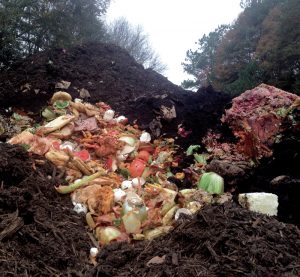
The Horry County Solid Waste Authority (located near Myrtle Beach) began accepting food waste in July at its composting facility located at the authority’s landfill. Its clients include Coastal Carolina University and several Horry County schools. Food waste is hauled to the facility by Smart Recycling. And EPA Region 4 is working with DHEC, the Department of Commerce and other stakeholders including the City of Columbia, Richland and Lexington counties, Fort Jackson and the University of South Carolina, to look into the possibility of developing organics recovery infrastructure in the Columbia area (located in the center of the state).
Existing Infrastructure
While new organics processing infrastructure is needed, successful composting operations are already in place in South Carolina. Charleston County’s Bees Ferry Compost Facility was recognized as the 2014 Composting Program of the Year by the US Composting Council. The county’s organics recycling program, which began in 2003, has continually grown and is now the largest compost producer in South Carolina and one of the largest on the East Coast. It began accepting food waste from commercial businesses in 2010-2011 as part of a pilot program, operating under a Research, Demonstration and Development (RD&D) permit. The facility is now permitted as Type 2; no limits on quantity of material that can be accepted annually are specified in the permit. As a result, a number of haulers are collecting food scraps in the Charleston area, including Smart Recycling of South Carolina and Food Waste Disposal (FWD). FWD has hauled more than 6,500 tons of material since 2012 and provides Charleston County with 80 percent of its food waste feedstock. That, in turn, reflects the upward trend of food waste being collected in Charleston — increasing from 1,615 tons in FY 2012 to 1,841 tons in FY13 and 3,723 tons in FY14.
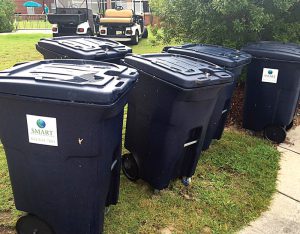 Colleges and universities were among the first in the state to divert food waste to composting. The Citadel, Clemson University, Coastal Carolina University, College of Charleston, Furman University, Medical University of South Carolina (MUSC) and Winthrop University have programs. The Citadel sent more than 245 tons of food waste to Charleston County’s facility — earning the second highest rating in the RecycleMania competition. Furman University is collecting food waste from dining halls on campus and composted nearly 29 tons in FY14 on its Furman Farm. MUSC recycled 92 tons of food waste in FY 13 and nearly 94 tons in FY15 (composted at Charleston County facility). Clemson’s food waste recovery has increased more than 1,000 percent since FY10, going from nearly 24 tons to more than 263 tons in FY14. Material is composted with yard trimmings at the university’s Cherry Crossing Research Facility. Finished compost is used on campus grounds.
Colleges and universities were among the first in the state to divert food waste to composting. The Citadel, Clemson University, Coastal Carolina University, College of Charleston, Furman University, Medical University of South Carolina (MUSC) and Winthrop University have programs. The Citadel sent more than 245 tons of food waste to Charleston County’s facility — earning the second highest rating in the RecycleMania competition. Furman University is collecting food waste from dining halls on campus and composted nearly 29 tons in FY14 on its Furman Farm. MUSC recycled 92 tons of food waste in FY 13 and nearly 94 tons in FY15 (composted at Charleston County facility). Clemson’s food waste recovery has increased more than 1,000 percent since FY10, going from nearly 24 tons to more than 263 tons in FY14. Material is composted with yard trimmings at the university’s Cherry Crossing Research Facility. Finished compost is used on campus grounds.
K-12 schools also are involved with composting food waste. In Charleston County, 46 elementary and middle schools collect pre and postconsumer food waste (see “Food Scraps Diversion Goes To School,” May 2014). FWD works with the Charleston County School District to haul this material to the Bees Ferry Compost Facility. The food waste is composted and returned to the schools and used in their landscaping. An elementary school in Spartanburg County diverts about 5,000 pounds/month of pre and postconsumer food waste.
Other businesses such as Sea Pines resort are composting food waste and yard trimmings on site and using the material on its grounds. Sea Pines, located on Hilton Head Island, has steadily increased its organics diversion since 2012 — recovering more than 34 tons of organics since the program began.
South Carolina also has several food waste equipment businesses. Divergent Energy, located in Duncan, manufactures a food scraps dehydrator. EnviroPure, located in Travelers Rest, manufactures on-site processing units. Concludes DHEC’s Deputy Director Elizabeth Dieck: “We believe we are headed in the right direction.”
Richard Chesley is a manager with the South Carolina Department of Health and Environmental Control’s Office of Solid Waste Reduction and Recycling.


